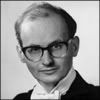Potemkin wrote:I was trained as a physicist (MPhil in nuclear physics), so I am completely unimpressed by analytic philosophers' claims to be more 'scientific' or more 'objective' than their synthetic counterparts. Once you throw out everything in philosophy which is not 'scientific' or 'objective', you're left with something which may (or may not) have some practical value as an adjunct to science (except that most practicing scientists completely ignore it), but it will have no other value.
I am not sure that analytical philosophers
do make this claim - and I am also unsure how a degree in physics makes you hostile to their claims. It is common to see analytic philosophers who were previously trained in mathematics or physics. A distinct claim, however, (which I think is warranted) made by analytic philosophers is that philosophy is no longer a discipline
different from the sciences but, rather, an extension of the sciences. Along with mathematics, it is an analytical method but deals with logic, propositions, etc. Historically, analytical philosopher simply believed they were
clarifying scientific propositions and demarcating scientific from pseudo-scientific propositions. Philosophy, in this sense, was only a method of
analysis that had no proper subject matter. I think there is some pull to this and most of the subject matter of philosophy has been, more or less, relegated to different scientific fields.
By 'mathematical' and 'scientific' philosophy is meant only the
philosophy of mathematics and
the philosophy of science (they are often used interchangeably). These fields tend to be treated better in analytic philosophy than they do in continental philosophy.
Moreover, to my knowledge,t he analytic/synthetic division has been largely discredited and I do not think that it would be appropriate to characterize continental philosophy as the 'synthetic counterpart' to analytic philosophy - although I know exactly what you mean.
Potemkin wrote:Its scientism, basically. That, and the fact that it tends to be practiced by snobbish upper-class Englishmen.
True. The 'height' of analytic philosophy (by this I mean logical positivism) certainly warrants its 'scientist' label. Even so, there is much that can be salvaged from this period in terms of method (esp. techniques in formal logic) - and it is worth noting that not all analytic philosophers agreed on a particular philosophy of science.
As to the second point. I am neither upper-class nor English, so I hope you hold no grudges.















 Surprising considering you're from the UK, unsurprising considering you're a Marxist. Sadly (or not), I do characterize myself as 'analytic' rather than continental- although I do think the distinction shouldn't be as pronounced. I use this distinction only to say that I am quite interested in mathematical and scientific philosophy.
Surprising considering you're from the UK, unsurprising considering you're a Marxist. Sadly (or not), I do characterize myself as 'analytic' rather than continental- although I do think the distinction shouldn't be as pronounced. I use this distinction only to say that I am quite interested in mathematical and scientific philosophy. 

 - By Tainari88
- By Tainari88 - By Pants-of-dog
- By Pants-of-dog - By Deutschmania
- By Deutschmania